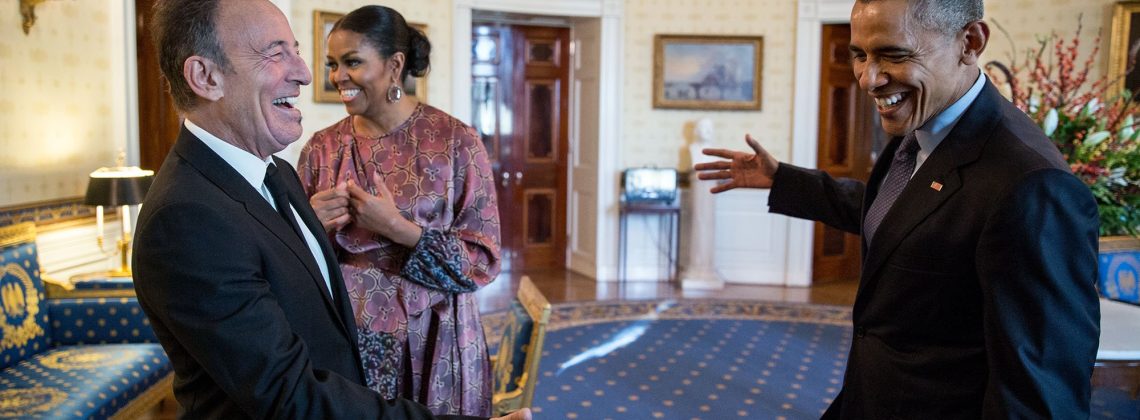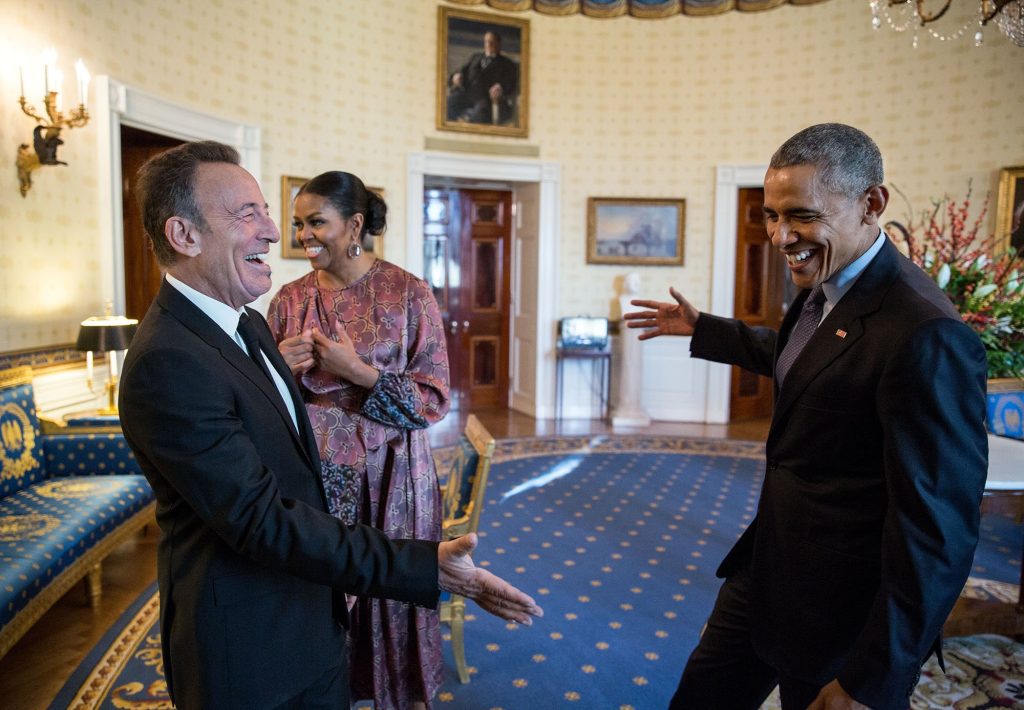

On Renegades, Obama and Springsteen let us in on a good conversation. Is it too much to ask for a better one?
The most memorable words F. Scott Fitzgerald ever wrote appear in his notes published along with his unfinished novel The Last Tycoon in 1941. They have been endlessly quoted for contradictory effect ever since: “There are no second acts in American lives.”
What the heck was Fitzgerald, wasting away in the depths of alcoholic despair, getting at? We much prefer Bob Dylan’s more existentialist response to spiritual stagnation in his 1965 song “It’s Alright, Ma (I’m Only Bleeding)”: “Pointed threats, they bluff with scorn / suicide remarks are torn / from the fool’s gold mouthpiece / the hollow horn plays wasted words / proves to warn that he not busy being born / is busy dying.”
There’s something to be said for endless self-creation and self-mythologizing, especially for those with the dubious burden of being American icons. If anything can be said to be an American birthright, it’s the act of “busy bein’ born” to keep from dying. The lives of all of our most interesting secular saints attests to this.
Ideally, along with new birth come new understandings and fresh narratives that fit the times we live in better than earlier takes concocted in the first blush of fame and audacity.
When Spotify announced that Barack Obama and Bruce Springsteen had recorded an eight-part podcast series called Renegades: Born in the USA we all looked forward to some world-class myth-making, shit-talking, good natured revisionism, and visionary hot-takes worthy of their collective reps as two of our most thoughtful and charismatic national icons. Would we find hints of new birth, too? Of some new understanding?
Renegades over-promises and under-delivers big time. Still, it is mostly enjoyable once expectations are massively lowered to mortal levels.
After all the hype, Renegades is about two outrageously wealthy, self-made men comparing notes on their formative years and drawing personal connections to the larger themes at work in American life.
Although they’ve been friends since 2008, when Springsteen took part in Obama’s first presidential campaign, they are not willy-nilly in spooling out personal anecdotes. One suspects that every observation has been test-driven before arriving at the microphone. None of their revelations sound spontaneous, although they are fascinating. Most of all, they demonstrate that it’s possible to defy prevailing archetypes of American manhood to become the most successful version of oneself, despite being as screwed up as the next guy.
For most of the series Obama asks the bulk of the questions and follows up Springsteen’s answers with lengthy takes of his own. It can get annoying at times, especially when he steps on the singer’s answers.
Springsteen, for his part, has settled into the wizened stage of rock celebrity quite well. At seventy-one he has no compunctions about freely tossing out f-bombs and other cuss words; life is too short to bother with polite euphemisms. Obama restricts his own cussing to a discreetly mumbled “shit” while telling a story, but it is obvious that neither is particularly scandalized by the other’s forthrightness.
While Springsteen alludes to his working-class Catholic background at times, neither man talks about religion beyond Obama’s anecdotes about delivering the eulogy at Mother Emanuel Church in Charleston, S.C., in 2015 after the murder of nine Black parishioners by a young neo-Nazi. Obama’s religious journey is of particular interest because he is so conversant in the Scriptures and Christian ideas, yet attended church rarely during his two terms. I suspect he’s going through a bout of reconstruction, as many thoughtful Christians are, but it would have been validating for many who are on a similar journey to hear that he’s a fellow pilgrim.
Although the warmth and connection between the two men translates well, it never rises to the level of the discomforting truth-telling these perilous times demand.
The problem may entirely be the fault of when the podcasts were recorded—before the November election and many months before the January 6 assault on the Capitol. This bad timing has inadvertently exiled Renegades to the outer circle of relevancy for those looking for more up-to-date narratives about our American moment. The biggest disappointment of the series is its failure to engage the naked and unadulterated challenge to the American democratic narrative they wax so eloquently about.
Although now a dramatically muted presence, Donald Trump still casts a shadow on our politics—yet he’s missing from this series except as a passing reference as Obama’s “successor.” Given January 6, the series has a Trump-sized hole in it that will make a lot of folks scratch their heads. The threat to democracy we’re living needs a name.
If I were a part of the team putting together this podcast I would have called an emergency meeting on Zoom a day after the Capitol invasion and gotten Obama and Springsteen to agree to return to the studio to record fresh episodes. These two men talking off-the-cuff about Trump’s second impeachment, the moral collapse of the Republican Party, the inauguration of Joe Biden, poet Amanda Gorman’s take on the American Dream, the failure of QAnon prophecy, and the movement within Republican-controlled state legislatures to disenfranchise nonwhite voters would have introduced urgency into a series that feels sleepy, predictable, and NPR-ish at times.
The best conversations take place between folks trying to persuade each other of the superiority of their model of reality, their view of the world. A certain amount of friction, even if it is polite and deferential, carries big ideas a long way because it forces listeners to evaluate their own arguments and perceptions. Astute listeners love detecting the verbal sleights-of-hand and the questionable elements in an argument. They love furrowing their brow and asking themselves, “Is he/she right about this? Let me look this up.”
Because of the long friendship between these men, many listeners hoped for a level of mutual probing several levels above what interlocutors from Rolling Stone or Politico could expect to get away with. Obama and Springsteen understand each other’s worlds because they intersect at so many points. Renegades would have been far more interesting had they taken advantage of their insider status to critique what Joni Mitchell called “the star maker machinery” when she, at the height of her popularity, dared complain about fame’s inherently Faustian bargain.
What is the title “Renegades” even supposed to refer to, given that neither Obama nor Springsteen can reasonably be considered renegades on any particular level at this point? Folks who hobnob at Davos or Martha’s Vineyard forsake that honorific unless they earn it by becoming traitors to their class.
I wouldn’t put it past either Barack Obama or Bruce Springsteen to have a completely unexpected second American life that upends everything that’s come before. They’re restless men who have hinted that they’re still not completely happy with the status quo, but they haven’t spoken openly about what would be a fitting—or even possible—response for two super rich American icons committed to staying “busy bein’ born.” Maybe giving Renegades another go closer to the midterms—when things are falling apart in the country—will inspire some real talk from two exceptionally interesting men.
Tony Norman is a columnist at the Pittsburgh Post-Gazette. He is also president of the National Society of Newspaper Columnists.Tonynormanwriter@gmail.com.
Tony Norman is a columnist at the Pittsburgh Post-Gazette. He is also president of the National Society of Newspaper Columnists.Tonynormanwriter@gmail.com.